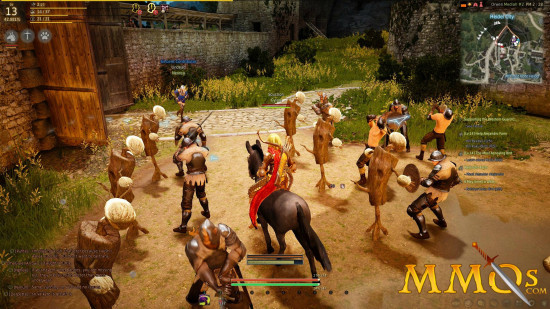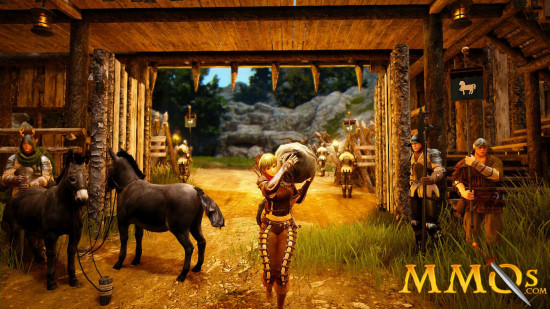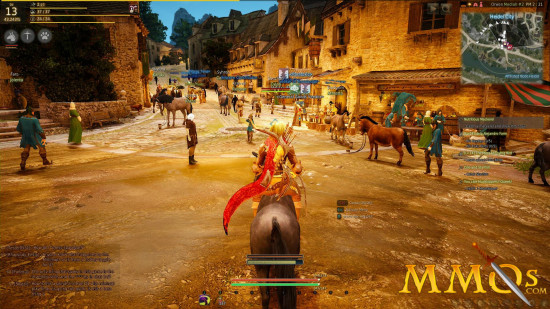Black Desert Online: MMORPG Development Done Right

On September 14, 2017 Pearl Abyss, the Korean studio behind Black Desert Online, went public. Two weeks prior, the company held a news conference detailing their history and their plans for the future. As part of that conference, the company released a slew of interesting numbers pertaining to their business. These included revenue numbers, unit sales, staffing numbers, and so on. While we covered the story in our news section, I felt that some of those numbers were important enough to discuss in more detail as they provide significant insights into the overall MMORPG industry and how MMORPG development is done.
It's no secret that the MMORPG industry has been in a rut for the past decade. We’re still reeling from the binge and hangover following the collective rush to copy World of Warcraft’s success. Gargantuan projects like Warhammer Online, Tabula Rasa, Project Titan, and even a Halo MMO crashed and burned, taking hundreds of millions of dollars worth of development budgets with them. Even the World of Warcraft inspired MMORPGs that managed to cling to life such as Star Wars The Old Republic and The Elder Scrolls Online (budget $200m each) had to pare down their expectations and change their business models just to survive.
Since then, it has somehow become conventional wisdom that anyone looking to develop a full fledged MMORPG needs a budget running into the tens, if not hundreds of millions. Evidence of this comes from both established studios and crowdfunded startups alike. Neowiz Games has spent $61 million to date on their beguiled fantasy MMORPG Bless Online. Intrepid Studios founder Steven Sharif estimates that getting to a viable build for Ashes of Creation will take a budget of $30 million. But is this normal? Are MMORPGs just inherently expensive to develop? World of Warcraft it self was extremely expensive with a total cost of $40 million back in 2004. Its no wonder that studios hoping to chase WoW’s success today would feel obliged to at least match that level of spending.
But if we look further back than World of Warcraft, we can see that such high development costs were far from the norm. EverQuest, the game that inspired World of Warcraft itself, had an initial development budget of $3 million. Dark of Camelot, released in 2001, was built by 25 developers in 18 months at a cost of $2.5 million. You may have a hard time believing these numbers, or write them off as irrelevant to today’s gaming industry. Fine, let’s end the history lesson and get back to the present. Black Desert Online entered open beta testing in its home market of South Korea in 2015. It reached the West in 2016 and was the most impressive MMORPG launch of the year, winning both MMORPG of The Year and Best Graphics from us. The game garnered similar praise from across the MMORPG press. Black Desert boasts fluid action combat, high end visuals, an open world with no loading screens, a single server (with multiple channels), open PvP with territorial control, and a host of other features. The cost of developing this expansive MMORPG? ~$1 million USD.
Just take a moment to let that number sink in. According to the CEO of Pearl Abyss, Black Desert Online was created with a development budget of just $1,000,000. How is that possible? There are two, related factors that explain that low budget. The first is that Pearl Abyss built their own, in-house engine. While it's generally assumed that using an off the shelf engine like Unity or Unreal dramatically reduces development costs, real world examples just don’t bare that out. The second reason for the low budget is the fact that fully 87% of employees at Pearl Abyss are developers. You have a studio full of developers who are developing on an engine they built themselves. Anything they want done, they can get it done, in-house, right away. Contrast this with how many studios in the West are staffed. It seems the emphasis here is on designers, visionaries, creative directors, and all sorts of other people. Developers, while present, are hardly even close to 50% of the team. The technical skills required to fashion a game engine usually indicate a level of developer competence that goes deeper than manipulating an existing engine. This is why, more often than not, many games built on the same engine “feel” similar. It's easier to find “developers” who have experience dragging and dropping assets into an Unreal Editor window than doing the hard work of building a world from scratch.
Pearl Abyss’s operational competence doesn’t stop there. They also have a fully equipped sound room and motion capture studio in-house. Many studios just farm this work out, or rely on the built-in features of whatever off the shelf engine they’ve licensed. It's the same reason it costs me more to repair my car than a car enthusiast who can swap out his own engine, do body work, etc in their fully equipped garage at home.
Now for some caveats. We don’t know if that $1mil figure includes the costs involved in developing the engine as well. We do know Pearl Abyss is currently working on 4 new titles, presumably all built on the that same engine. Even if BDO’s budget is independent of the engine’s budget, I still feel confident in claiming Pearl Abyss has done a masterful job with both the engine and the first product built on that engine. Any future release would dilute BDO’s share of the costs related to the engine.
Despite tackling all the technical aspects of development in-house, Pearl Abyss wisely chose to work with publishers to help release the game. They signed regional publishing agreements in Japan, Russia, Europe, North America, South America, China, and even in their home market of Korea. A Steam launch followed and a console release for the Xbox One is also on track. There’s even a mobile version in the works. A willingness to work with third party distributors, including publishers and platform owners, meant the game managed to reach a global audience within a very short period of time. Contrast that with Blade & Soul, another Korean MMORPG that took half a decade to reach the West following its initial release.
Pearl Abyss has enjoyed enormous, and well deserved success with Black Desert Online. The game has reached over $300 million in total revenue thus far, with 530,000 copies sold on Steam alone. Additional versions servicing Turkey, SEA, and the Middle East are in the works, and the Chinese version is almost ready to launch (via Snail Games). With 200,000 pre-orders already lined up in China, that market could prove to be their largest yet. I suspect the Xbox One version will also perform extremely well. Console gamers are even more insistent on action combat than PC players, and there are no console MMORPGs that can compete with BDO on the graphics front.
Now that Pearl Abyss is a publicly listed company, we will have an opportunity to see how they’re doing every 3 months. My guess is the studio will continue to perform well, and may even be bought out by one of the many international gaming companies currently on a buying binge. Hopefully their frugality and competence set an example for the rest of the industry to follow. Innovative, high quality MMORPGs don’t have to cost as much as Hollywood blockbusters to develop. I’ll leave this column off with a list of interesting numbers and links to additional resources where you can learn more about Pearl Abyss. Do you think Pearl Abyss and Black Desert Online represent a good model for other MMORPG studios to follow? Is my assessment way off the mark? Share your thoughts below!
Black Desert Online, by the Numbers:
- 2010 - Studio Founded
- 7,650,000 - Registered users
- $300,000,000 - Revenue since 2015
- 530,000 - Copies sold on Steam
- 200,000 - Pre-orders in China
- $1,000,000 - Development cost
- 87% - Percent of Pearl Abyss staff who are developers
- 4 - Number of games Pearl Abyss has under development
Further Reading: Pearl Abyss Company History, Pearl Abyss IPO Investor Conference





